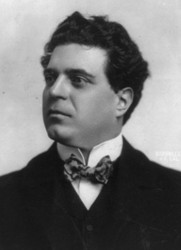Pietro Mascagni
Da Wikipedia, l'enciclopedia libera
Pietro Mascagni (Livorno, 7 dicembre 1863 – Roma, 2 agosto 1945) è stato un compositore e direttore d'orchestra italiano. Mascagni visse a cavallo tra Ottocento e Novecento e il successo formidabile ottenuto nel 1890 col suo primo capolavoro - la Cavalleria rusticana - non fu tuttavia eguagliato dalle opere seguenti, seppure di fattura sempre pregevole e molte delle quali entrate stabilmente nel repertorio, come ad esempio Iris. Egli compose la musica di quindici opere, d'un'operetta e di molti brani sia per orchestra che vocali, canzoni, romanze e musica per solo pianoforte.
From Wikipedia, the free encyclopedia
Pietro Mascagni (December 7, 1863 – August 2, 1945) was an Italian composer most noted for his operas. His 1890 masterpiece, Cavalleria rusticana, caused one of the greatest sensations in opera history and singlehandedly ushered in the Verismo movement in Italian dramatic music. However, though it has been stated that Mascagni, like Leoncavallo, was a "one-opera man" who could never repeat his first success, this is inaccurate. L'amico Fritz and Iris have been popular in Europe since their respective premieres. In fact, Mascagni himself claimed that at one point Iris was performed in Italy more often than Cavalleria (cf. Stivender). It is certainly a better vehicle for a popular lyric soprano.
Mascagni wrote a total of seventeen operas and operetta, several orchestral and vocal works, as well as songs and piano music. He enjoyed immense success during his lifetime, both as a composer and conductor of his own and other people's music. If he never repeated the international success of Cavalleria, it was probably because Mascagni refused to copy himself. The variety of styles in his operas—the Sicilian passion and warmth of Cavalleria, the exotic flavor of Iris, the idyllic breeze that ventilates the charming L'amico Fritz and Lodoletta, the Gallic chiaroscuro of Isabeau, the steely, Veristic power of Il piccolo Marat, the overripe postromanticism of the lush Parisina—demonstrate a versatility that surpasses even that of Puccini.
![]()

